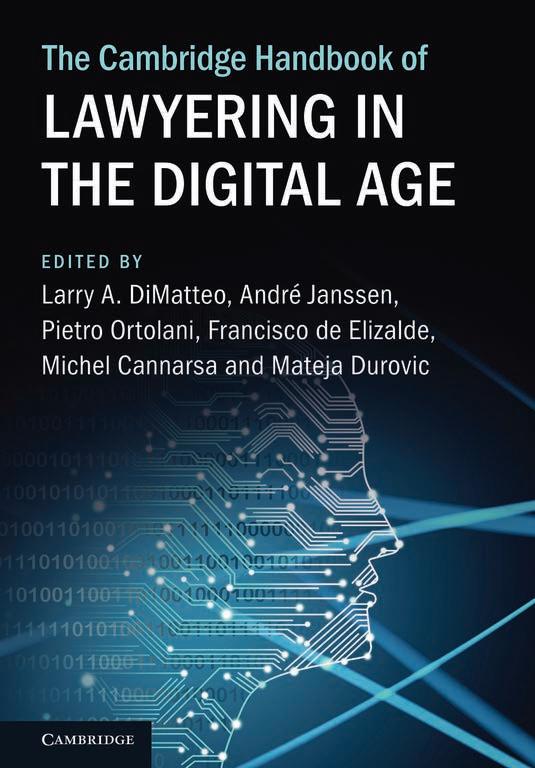
2 minute read
Propositions, Predication, and Assertion
The Cambridge Handbook of Lawyering in the Digital Age
Larry A. DiMatteo
Advertisement
University of Florida André Janssen
Radboud Universiteit Nijmegen
Pietro Ortolani
IE University Madrid Michel Cannarsa
Catholic Lyon University Mateja Durovic
King’s College London
Description
With increasing digitalization and the evolution of artificial intelligence, the legal profession is on the verge of being transformed by automated technology (legal tech). This handbook examines these developments and the changing legal landscape by providing perspectives from multiple interested parties, including practitioners, academics, and legal tech companies from different legal systems. Scrutinizing the real implications posed by legal tech, the book advocates for an unbiased, cautious approach for the engagement of technology in legal practice. It also carefully addresses the core question of how to balance fears of industry takeover by technology with the potential for using legal tech to expand services and create value for clients. Together, chapters develop a framework for analyzing the costs and benefits of new technologies before implementing them into legal practice. This interdisciplinary collection features contributions from lawyers, social scientists, institutional officials, technologists, and current developers of e-law platforms and services.
Key Features
• Provides an up-to-date analysis of the current and possible uses of technology in legal practice, along with the regulatory initiatives in this area
• Covers areas of both public and private law while addressing issues such as the role of government regulation and judicial use of technology • Offers a detailed perspective on the future of legal professions
Contents
1. Lawyering in the Digital Age; Part I. Effects of Technology on Legal Practice: 2. Disruptive effects of legal tech; 3. The effects of technology on legal practice: from punch card to artificial intelligence?; 4. Legal drafting and automation; 5. Emerging rules on artificial intelligence: Trojan horses of ethics in the realm of law?; Part II. Legal Tech and ADR: 6. Legal tech in ADR; 7. A blockchain-based smart dispute resolution method; 8. Digital dispute resolution: blurring the boundaries of ADR; Part III. Legal Tech in Consumer Relations and Small Claims 9. Legal tech in consumer relations and small-value claims: a survey; 10. Regulation of legal services and access to justice in the digital age: a war report; 11. Legal tech and EU consumer law; 12. The two faces of legal tech in B2C relations; Part IV. Legal Tech and Public Law: 13. Blockchain’s heterotopia: technological infrastructures and lawyering in the public sector; 14. Fundamental rights and the use of artificial intelligence in court; 15. Legal tech in public administration: prospects and challenges; Part V. Legal Ethics and Societal Values Confront Technology: 16. Ethics guidelines for trustworthy AI; 17. Ethical digital lawyering: technical and philosophical insights; 18. Law, disintermediation, and the future of trust; Part VI. Fate of the Legal Professions: 19. Lawyering somewhere between computation and the will to act: a digital age reflection; 20. Surviving the digital transformation – a method for lawyers to approach legal tech; 21. Road forward: promise and danger.
Additional Information
Level: Academic researchers, graduate students, legal practitioners Series: Cambridge Law Handbooks
July 2021 254 x 178 mm c.500pp 978-1-108-83746-0 Hardback £200.00 / US$260.00










